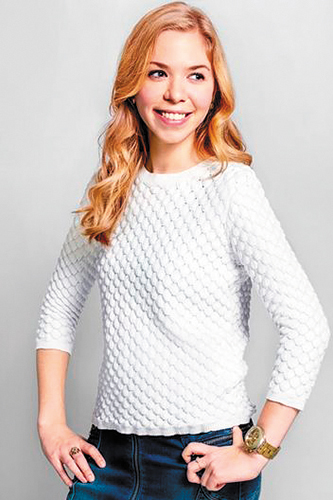
Last month I received a text message from a friend of mine asking whether or not I would be interested in appearing on a segment of NBC’s New York News. My heart immediately began to race. “Of course!” I responded. I was in the middle of a program for school and frantically whispered to my friend sitting in front of me, telling him the news.
I was asked to come down to 30 Rockefeller Center as soon as possible for a short interview that would be part of a story relating to eating disorders and the media. I was excited and thrilled at the opportunity. I told a few friends and a professor about this and everyone immediately asked, “What are you going to wear?” I also called my mother as I approached the famous doors of Rockefeller Center and she asked me, “What are you wearing? Do you have any makeup on?”
Fast-forward to mid-March when my photo and quote were featured in Glamour magazine, and my photo and guest blog also appeared on their site. I had gone to Glamour for a photo shoot in December when they contacted me and asked me if I’d like to be featured as a “woman in recovery” for a story on eating disorders. The questions I received after I told some select friends and family about Glamour were: “What did you wear? Did they do your makeup? Do you have photos?”
I understand why these questions were asked. We all present a part of ourselves when we show ourselves to others. Appearances are a part of life; there is no way to completely hide the way we look. Yet, we can work to battle the constant focus that exists as a result of the greater culture.
By agreeing to be photographed for Glamour magazine, one might argue that I was giving in to the greater values dictated by the culture of looks and standards. One of the first things I asked when arriving on set was, “This isn’t going to be photoshopped, correct?” We live in a society when Photoshop and airbrush are rampant among ads and industries, convincing men and women that they ought to look a certain way when in reality the people they see in advertisements don’t actually look that way. We are encouraged to wake up each morning and rather than think about the best person we can be, instead to think of the best way to look.
As a child I remember waking up and spending time focusing on the morning customs: Modeh Ani, eating breakfast, looking over homework. Somewhere in the teenage years the morning becomes about outfits, hair, and makeup—though this is not the case for everyone. When I sat down in the makeup artist’s chair at Glamour he asked me what types of makeup I use, what shades, what’s my makeup routine? I stared blankly back into his eyes in the mirror. “Sorry, what? Makeup routine? Maybe some eyeliner and lip balm?” I don’t often wear makeup.
This is not to say that I roll out of bed and emerge into the world looking unkempt. Rather, I have learned that my confidence takes me much further than my makeup routine. Makeup can be fun; styling one’s hair can feel great! And yet, it has become overvalued and almost seems “necessary” for some people when they leave the house in order not to feel embarrassed or ashamed.
When I was asked what I was wearing to my unexpected NBC interview, I laughed. “I’m wearing what I put on this morning…the story will speak for itself.” At Glamour I was given what to wear and my makeup and hair were done for me. And yet I do not hold pride in the curls in my hair or shades around my eyes; it is the quote below my photo that makes feel good. It is the story that I wrote about overcoming my Anorexia, and the title “Recovered Women” that makes me feel proud and confident.
Numerous friends have called me after seeing the Glamour piece and told me how nice I look. And yet, it is not these compliments that make me smile. It is hearing how happy I look in the photo, how I am beaming and alive. I was once in such a state that I refused to be in any photos; I was living in the shadows, waking up each morning to spend long minutes scrutinizing my appearance. Now when I look in the mirror, I see a confident woman with much to offer. It is my pride in my work, interests, relationships, and personal history that gives me a strut in my step, not any shade of lipstick.
By Temimah Zucker











